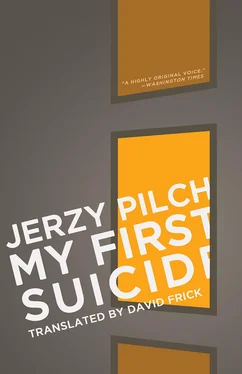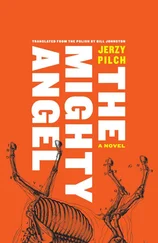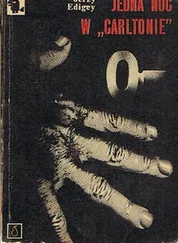“I have them with me not because I brought them on purpose for a meeting with you, but because I never part with some of my works. Never. Yes, sir. I dabble in writing as an amateur, and perhaps not at all as an amateur. I have written, among other things, A Natural History of the Cieszyn Land . I do not carry around with me that one and only title that has appeared, up to this point, in print. That is, I do sometimes, but not always. It depends on my mood, as well as a whole series of other circumstances. Today I took with me three of my novels, which are of a documentary nature. One is about prewar times, the second about the war and the occupation, the third about Communist rule. That last one is a sort of Polish People’s Republic family saga, and I am rather satisfied with the results. But I implore you! I implore you! Please have no fear. I do not intend to burden you with reading matter, to ask you for your judgment or some sort of support with the publishers. Granted, I have written quite a lot in my free moments, but I am in no hurry to get them published. No hurry at all.”
I wondered how old he might be. In his manner of speaking, gestures, mannerisms, dress, he made the impression of an old man, my senior by a good half century, but, finally, let’s not exaggerate here. I myself am over fifty, and even the most vigorous hundred-year-olds don’t look as vigorous as he did. How old could he be? Eighty? Seventy-five? Was he young? Not much older than me, but stylized and made up to look like a venerable old man?
“Don’t think about my age. I’m as old as everyone — to use the famous phrase of a certain Polish writer, who has been dead for quite a few years, and thereby is already, in the strict sense, as old as everyone. Eternity is endlessly short and always the same. But to return to my interests, I also have to my credit a book on March ’68, a book about Martial Law (the least successful of them all), and a still unfinished piece that is completely contemporary. But — I repeat — I do not intend to present any of these works to you, not even fragments of them. I don’t intend to summarize anything I’ve written. On the contrary, I wish to tell you a story that I haven’t written down, and which I never will write down. I mention my passions only so that you might be able to figure out what sort of maniac you are dealing with.
“So, as you can quite easily see, I am the sort of maniac whose ambition it is to reflect with his pen the surrounding world and epochs in which he chanced to live. The reflection of one who is involved in the support of, and sympathizes with, the most noble of values. I am from an extinct tribe, one that thought that books must contain history, the nation, society, and patriotism. This was the spirit in which I have always given my lectures, and it was these convictions that I sought to produce in my pupils. Yes, sir! I am a teacher of many years’ standing in the local gymnasium . A few times, in epochs of various thaws, I was even head of school. It never lasted long. Two years early in the Gomułka regime, one year early on under Gierek, and a few months during Solidarity the first time around. For years now, it goes without saying — retired. I belong to the tribe that was brought up on Stefan Żeromski. You would like to be Stefan Zweig, I would like to be Stefan Żeromski. Come to think of it, what an unusual couple of epigones! A second Zweig and a second Żeromski! A breathtaking stunt of the purest form. Let’s drink to our grotesque-macabre duet! Due Stefani — vedetti of the evening! Let’s also drink to the fact that we will never equal our masters. You in life, I in art. You will never commit suicide like Zweig, and I will never write like Żeromski. Incidentally, are you aware that a whole series of very interesting suicides has been committed here At the Sign of the Falcon ? Yes, sir! Very interesting. But this is a topic for another time. How do I know that you won’t commit suicide? I don’t know. The thought often crosses your mind, that’s clear. It crosses everyone’s mind. It crossed the mind of the namesake of our deservedly weary receptionist, Emil Cioran. For all of his life, he was occupied with suicide. All his life, he wrote about suicide, and somehow or other he lived to be eighty. It seems that in your own family there was a figure who spent his entire life preparing to leave this one and yet, somehow or other, lived to a ripe old age. There are analogies. Besides, you know, you might simply not have time for suicide. You have to write your own suicide before the fact, and you have begun late. You simply might not have the time for it. And as Scripture says: To everything there is a season. Suicide also has its season. If a person doesn’t manage to kill himself at the appropriate moment, he has to live thereafter for nothing. And many, endlessly many people live like that. They live only because it is too late even for suicide. Yes, sir! You don’t have enough time to commit suicide, and I don’t have enough time to become Żeromski. Let’s hope! For, should it come to pass, that would be the tragedy. You, after your suicide, would at least have peace. But me? Suddenly blessed with the uncontrollable word-stream of the author of The Coming Spring ? What would I do then? Please, in no way take this confession as fishing for compliments by claiming a lack of talent. On the contrary — I have talent. But I also have a certain lack. Precisely a lack. I lack the specific. I have a certain writerly lack that always seemed unimportant to me, but which, with time, has become a nagging one. Namely, I don’t know how to write about women. And in my haughty, conceited opinion, it is only in this range that I’m not a Żeromski. Only in this one aspect. Because he knew how to write about women. Say what you want, he knew. I console myself, or rather I consoled myself, I consoled myself for a long time, that my pieces weren’t any sort of romances but quasi-documents. I consoled myself that there exist outstanding works of literature — we need look no further than precisely the Chess Story of your master — in which there aren’t any women or erotic love, but there is, nonetheless, a sharp image of the world. I comforted myself with a sort of unformulated moralizing program: that, supposedly, in an epoch of universal pornography, it is time for extreme puritanism. I comforted myself as best I could, but still, with time, the lack of an aspect which is not even so much romantic as sensual, became simply unbearable. Absolutely unbearable. You know, I don’t know how to write about women, because I never think about women. I was once married, became a widower long ago; and the love affairs that came my way seem to me so remote today that I am almost certain that they didn’t occur in my lifetime. I don’t think about women, therefore I don’t know how to write about them. So much is clear. It’s impossible to record what doesn’t take shape in your head. At this point, yet another troublesome plot twist comes into play, so troublesome, that in revealing it, I am bordering on exhibitionism…
“If you permit, another round for courage? To your health. To the health of the ladies. That’s just it. It’s easier after a drink. After a drink, it is a lot easier. After a drink, it is much easier to think about women. Much, much easier. The fact of the matter is, I don’t think about women at all when I am sober. But once I have had a drink, I begin to think about them intensely, I begin to think about them fluently, and I begin to think about them copiously. Such is my — you must admit — rather boorish syndrome. After a drink, I get a hankering for the erotic. Not in any practical sense. After a drink, I get a hankering for sex — but in the intellectual sense. After a drink, I can compose romantic aphorisms; after a drink, I can think about the erotic in orderly fashion; after a drink (but a big one!), I am even able to sketch a bedroom scene. But only orally. Not in writing. If I knew how to write after a drink, I would be — if you please — Stefan Żeromski, in the strict sense; I would be Żeromski through and through; I would be more than Żeromski. You will forgive me, but if I knew how to write after a drink, I would be Żeromski to a significantly greater degree than you are Zweig when sober. Granted, better a sober Zweig than a drunk Żeromski, but the tragedy of Polish literature depends — among other things — on the fact that Żeromski didn’t drink, and that Zweig wasn’t present at all. Yes, sir. After a drink, I’d write totally unprecedented histories of sin, but after a drink I am unable to write a single letter. I can only narrate orally. Only oral transmission comes into play. The song of the Wajdelota. Then , I can tell a story. Yes, sir! That’s when I can tell a story.
Читать дальше












